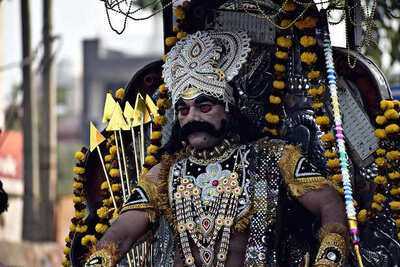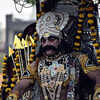
We’re taught stories young, who’s good, who’s evil. Rama is the hero. Ravana is the villain. Case closed. But life doesn’t work like that, and neither does mythology. The older you get, the more you realize: the lines between right and wrong, black and white, are drawn by the storyteller. And sometimes, the one painted as the monster may have just told the truth too soon or too loud. Ravana, the ten-headed king of Lanka, is one of those figures. Brilliant, bold, and deeply flawed. He was a master of the Vedas, a fierce devotee of Shiva, a ruler of great intellect, and yes, a man who made a grave mistake. But is one mistake enough to erase a lifetime of brilliance? In some places, the answer is no.
1. Sri Lanka

Ravana is seen as hero, not villain.
In Sri Lanka, Ravana isn’t just a footnote in Rama’s story. He is the story. Many locals see him as a misunderstood hero—brilliant, devoted, deeply rooted in their ancient heritage. Temples dedicated to Ravana exist. Sites like Ravana Ella Falls and Ravana’s Cave are seen not as mythical but historical.
To them, Ravana wasn’t a demon. He was a king who stood for his land, protected his people, and lost a war—but not his dignity. It reminds us how location changes perception. Whose version of the story are we listening to? And why do we forget that even kings fall? And that sometimes, those who fall hardest were simply standing up for something we refused to see?
2. India

Worshipped in temples where he’s honored as kin.
India burns Ravana every Dussehra—publicly, loudly, symbolically. And yet, in a quiet contradiction, there are places in the very same country where Ravana is not burned—but bowed to. In Mandsaur, Madhya Pradesh, he’s seen as a son-in-law, married to a local princess. In Vidisha, and parts of Kangra, temples are built in his honour. In some regions, people don’t celebrate his death—they honour his knowledge.
The contradiction isn’t hypocrisy. It’s complexity. Ravana, for all his flaws, was a Brahmin, a Shiva devotee, a scholar. Burning him is symbolic. But remembering him is human. Maybe we need both. The fire to destroy ego. And the reverence to remember depth.
3. Nepal

Depicted as noble ruler with tragic pride.
In the Nepali tellings of the Ramayana, Ravana isn’t always the clear-cut villain. He’s often shown as a powerful ruler with a deep sense of dharma, whose downfall came not because he was evil, but because he was proud. His character isn’t dismissed—it’s dissected. His virtues, as much as his flaws, are explored.
Nepal reminds us that interpretation changes everything. That the same story, told from a different altitude, can feel entirely new. What we label as arrogance might be misunderstood conviction. What we call ego might just be resistance.
4. Bangladesh

Folk retellings show him as flawed, not evil.
In some parts of rural Bangladesh, Ravana isn’t worshipped, but he isn’t vilified either. Folk retellings of the Ramayana give him space: to be wise, to be flawed, to be tragic. The performances don’t flatten him into evil—they humanize him. And in that act, something shifts.
To humanize someone history called a demon is radical. It shows a culture’s maturity to hold contradiction. To allow pain, glory, failure, and devotion to exist in the same man, and not need to simplify him to feel safe.
5. Indonesia

Shadow puppets portray him with depth and nuance.
In Bali, the Wayang Kulit performances, traditional shadow puppetry, often depict Ravana as both a villain and a noble king. It depends on the day. On the moral. On the question being asked. There’s nuance. Space. A refusal to rush to conclusions.
Ravana, through these puppets, teaches something profound: that a man can hold darkness without being defined by it. That our flaws don’t cancel our gifts. That the shadows in us don’t make the light meaningless.
The Myth Isn’t About Ravana, It’s About Us Ravana isn’t worshipped because people forgot what he did. He’s worshipped because people remembered who he was despite what he did. In an age where we cancel people in seconds, erase them with labels, and reduce legacies to headlines, maybe it’s time we reconsider. Ravana forces us to ask uncomfortable questions:
Can a man be both wise and wrong?
Can devotion exist in someone who made a mistake?
Can power and pride coexist with sincerity?
And more importantly: Do we have the maturity to hold complexity? Because worship doesn’t always mean agreement. Sometimes, it means respect. Sometimes, it means forgiveness. And sometimes, it’s a silent prayer to remind ourselves, we’re all more than our worst decisions.
 We’re taught stories young, who’s good, who’s evil. Rama is the hero. Ravana is the villain. Case closed. But life doesn’t work like that, and neither does mythology. The older you get, the more you realize: the lines between right and wrong, black and white, are drawn by the storyteller. And sometimes, the one painted as the monster may have just told the truth too soon or too loud. Ravana, the ten-headed king of Lanka, is one of those figures. Brilliant, bold, and deeply flawed. He was a master of the Vedas, a fierce devotee of Shiva, a ruler of great intellect, and yes, a man who made a grave mistake. But is one mistake enough to erase a lifetime of brilliance? In some places, the answer is no.
We’re taught stories young, who’s good, who’s evil. Rama is the hero. Ravana is the villain. Case closed. But life doesn’t work like that, and neither does mythology. The older you get, the more you realize: the lines between right and wrong, black and white, are drawn by the storyteller. And sometimes, the one painted as the monster may have just told the truth too soon or too loud. Ravana, the ten-headed king of Lanka, is one of those figures. Brilliant, bold, and deeply flawed. He was a master of the Vedas, a fierce devotee of Shiva, a ruler of great intellect, and yes, a man who made a grave mistake. But is one mistake enough to erase a lifetime of brilliance? In some places, the answer is no.




